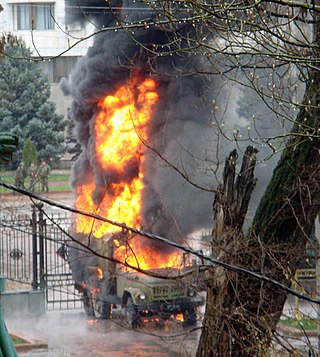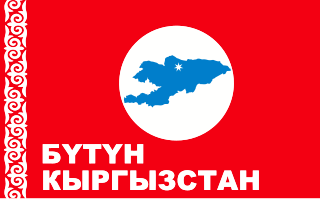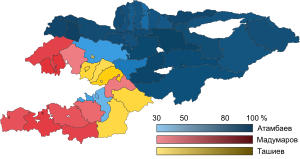
The history of the Kyrgyz people and the land now called Kyrgyzstan goes back more than 3,000 years. Although geographically isolated by its mountainous location, it had an important role as part of the historical Silk Road trade route. Turkic nomads, who trace their ancestry to many Turkic states such as the First and Second Turkic Khaganates, have inhabited the country throughout its history. In the 13th century, Kyrgyzstan was conquered by the Mongols; subsequently it regained independence but was invaded by Kalmyks, Manchus, and Uzbeks. In 1876, it became part of the Russian Empire, remaining in the USSR as the Kirghiz Soviet Socialist Republic after the Russian Revolution. Following Mikhael Gorbachev's democratic reforms in the USSR, in 1990 pro-independence candidate Askar Akayev was elected president of the SSR. On 31 August 1991, Kyrgyzstan declared independence from Moscow, and a democratic government was subsequently established.

The politics of Kyrgyzstan, officially known as the Kyrgyz Republic, takes place in the framework of a presidential system representative democratic republic, whereby the President is head of state and the Chairman of the Cabinet of Ministers is head of government. Executive power is exercised by the government. Legislative power is vested in both the government and parliament. The Economist Intelligence Unit rated Kyrgyzstan an "authoritarian regime" in 2022.
The Tulip Revolution, also known as the First Kyrgyz Revolution, led to then-President Askar Akayev's fall from power. The revolution began after parliamentary elections on 27 February and 13 March 2005. The revolutionaries alleged corruption and authoritarianism by Akayev, his family and supporters. Akayev fled to Kazakhstan and then to Russia. On 4 April 2005, at the Kyrgyz embassy in Moscow, Akayev signed his resignation statement in the presence of a Kyrgyz parliamentary delegation. The resignation was ratified by the Kyrgyz interim parliament on 11 April 2005.

The president of Kyrgyzstan, officially the president of the Kyrgyz Republic, is the head of state and head of government of the Kyrgyz Republic. The president directs the executive branch of the national government, is the commander-in-chief of the Kyrgyz military and also heads the National Security Council.

The Social Democratic Party of Kyrgyzstan (SDPK) was a centre-left political party in Kyrgyzstan. The SDPK was one of the oldest and largest political parties in the country. The party took an active part in the Tulip Revolution and the 2010 Revolution. The party's members included three presidents of Kyrgyzstan: Roza Otunbayeva, Almazbek Atambayev and Sooronbay Jeenbekov.

Almazbek Sharshenovich Atambayev is a Kyrgyz politician who served as the President of Kyrgyzstan from 1 December 2011 to 24 November 2017. He was Prime Minister of Kyrgyzstan from 17 December 2010 to 1 December 2011, and from 29 March 2007 to 28 November 2007. He served as Chairman of the Social Democratic Party of Kyrgyzstan (SDPK) from 30 July 1999 to 23 September 2011.

Kazakhstan–Kyrgyzstan relations refers to the bilateral diplomatic relations between the Republic of Kazakhstan and the Kyrgyz Republic. Bilateral relationships between the countries, which share a border, are very strong and Kyrgyz and Kazakh are very close in terms of language, culture and religion. Kyrgyz-Kazakh relationships have always been at very high level and economic and other formal connections of two countries have been greeted with strong appreciation by both nations since the two share a lot in common.

Presidential elections were held in Kyrgyzstan on 23 July 2009. The date was set after the constitutional court ruled that the extension of the presidential term from four to five years did not apply until the next presidential election, calling for elections by 25 October 2009; in response, a parliament committee proposed the July election date, which was then passed by the incumbent president Kurmanbek Bakiyev's Ak Jol-dominated parliament. Bakiyev had previously announced his intention to run for reelection. Bakiyev was re-nominated on 1 May 2009.
United People's Movement is a coalition currently active in Kyrgyzstan. The coalition was formed in December, 2008 as an umbrella group representing various factions in opposition to Kyrgyz President Kurmanbek Bakiyev, and includes parties such as Ata Meken, Ak Shumkar, Asaba and Jany Kyrgyzstan, as well as the Social Democrats – which is the only party represented in parliament besides the ruling, and pro-Bakiyev, Ak Zhol.

A constitutional referendum was held in Kyrgyzstan on 27 June 2010 to reduce presidential powers and strengthen democracy in the wake of the riots earlier in the year. Parliamentary elections followed on 10 October 2010.

Early parliamentary elections were held in Kyrgyzstan on 10 October 2010. All 120 seats of the Supreme Council were elected by the party list system. Seats were allocated to all parties who obtained more than 5% of the vote overall and more than 0.5% in each of the nine provinces, capped at 65 seats per party.

The 2010 Kyrgyz Revolution, also known as the Second Kyrgyz Revolution, the Melon Revolution, the April Events or officially as the People's April Revolution, began in April 2010 with the ousting of Kyrgyz president Kurmanbek Bakiyev in the capital Bishkek. It was followed by increased ethnic tension involving Kyrgyz people and Uzbeks in the south of the country, which escalated in June 2010. The violence ultimately led to the consolidation of a new parliamentary system in Kyrgyzstan.

Ata-Zhurt or Ata-Jurt is a political party in Kyrgyzstan. Its political base is in the south of the country, but the party is headquartered in its capital Bishkek. In 2014, it merged with the Respublika party to create Respublika–Ata Zhurt, but the two parties ended up splitting again four months before the parliamentary elections of 2020, in which Ata-Zhurt instead formed a joint list with Mekenim Kyrgyzstan. After the results of that vote were annulled, Ata-Zhurt contested the 2021 elections independently and came in first with 19% of the vote. The party is led by Kamchybek Tashiyev, and has previously supported the ousted former President Kurmanbek Bakiyev.
The following lists events that happened during 2010 in Kyrgyzstan.

Sooronbay Sharip uulu Jeenbekov is a Kyrgyz politician who served as the fifth president of Kyrgyzstan from 2017 until his resignation in 2020, following a week of protests. Prior to that he served as the Prime Minister of Kyrgyzstan from April 2016 to August 2017.

Presidential elections were held in Kyrgyzstan on 15 October 2017. Incumbent President Almazbek Atambayev was not allowed to run again because the constitution sets a single six-year term for the head of state. Eleven candidates registered for the race, and from this field Sooronbay Jeenbekov of the Social Democratic Party of Kyrgyzstan won more than 50% of the vote, avoiding a runoff. Following certification of the results on 30 October, Jeenbekov was inaugurated as President of Kyrgyzstan on 24 November.

United Kyrgyzstan is a nationalist political party in Kyrgyzstan founded in 2010. It is generally more popular in the south of the country. The party is led by Adakhan Madumarov, who unsuccessfully ran for president of Kyrgyzstan in 2011 and 2017, coming second and third, respectively. It holds an ethnic nationalist ideology and supports a presidential system of government. The party was originally created to support Kyrgyz migrant laborers in Russia. The party won its first seats in the Supreme Council in the October 2020 parliamentary election, which was subsequently annulled. The party passed the 3% threshold in the 2021 parliamentary election and therefore is represented in the national legislature.

Parliamentary elections were held in Kyrgyzstan on 4 October 2020. The results showed that pro-government parties had won a supermajority of seats. The election was subsequently annulled by the Central Election Commission during the 2020 Kyrgyzstan protests.

The 2020 Kyrgyz Revolution, also known as the Third Kyrgyz Revolution, began on 5 October 2020, in response to the previous day's parliamentary election that was perceived by protestors as unfair, with allegations of electoral fraud. The results of the election were annulled on 6 October 2020. On 12 October 2020, President Jeenbekov announced a state of emergency in the capital city of Bishkek, which was approved by Parliament the following day. Jeenbekov resigned on 15 October 2020.

The Social Democrats is a political party in Kyrgyzstan founded in late 2019 by supporters of former President Almazbek Atambayev – legal successor from the Social Democratic Party of Kyrgyzstan (SDKP). After a conflict between Atambaev and his successor President Sooronbai Jeenbekov emerged and deepened in 2018, Atambayev accused of Jeenbekov in attempting to seize authority over the SDKP, a party that Atambayev himself formed in 1990s and served as a leader of. The SDK participated in the annulled 2020 parliamentary election. The current party leader is Temirlan Sultanbekov.


















